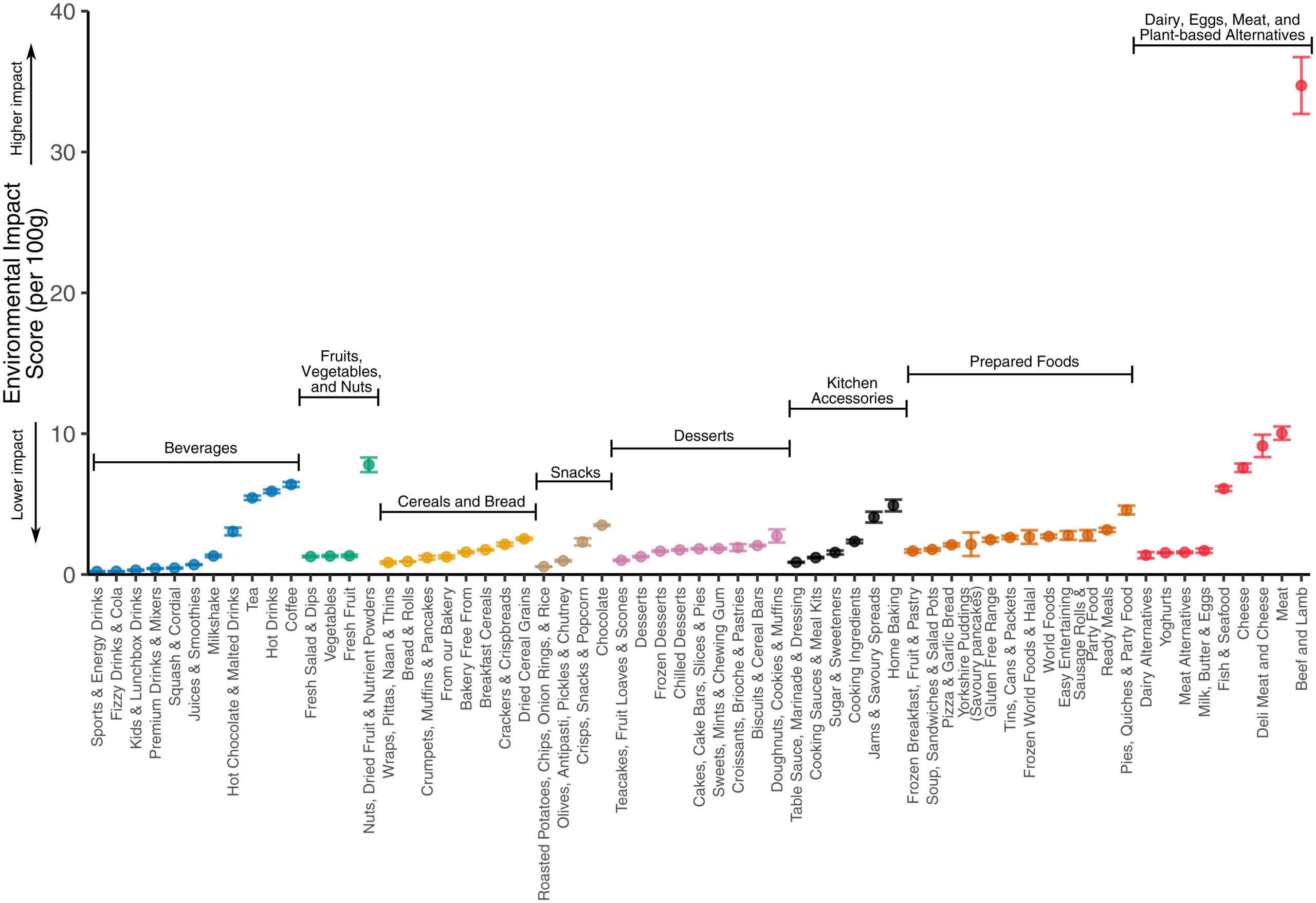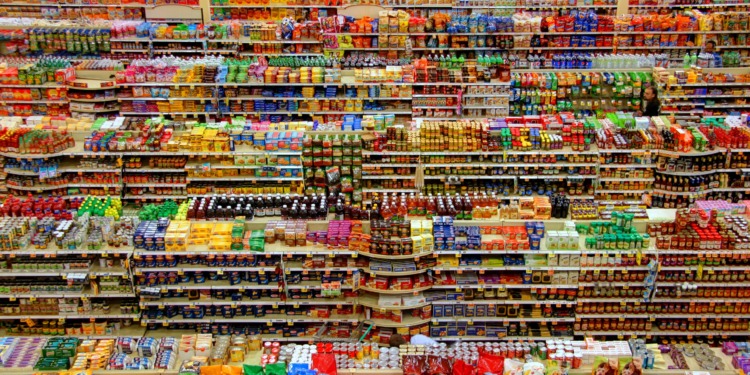Whether you’re already committed to a plant-based lifestyle, or simply just unsure about which milk alternative to order in your morning coffee, we are all becoming increasingly conscious about the impact our food choices are having on the environment.
As demonstrated in the UK Government Healthy and Sustainable Diets Consumer poll, 73% of the population are interested in making sure their food choices are environmentally friendly, but just under half (48%) of us feel confident in knowing how to actually achieve this.
Making sustainable choices when it comes to the food that we buy from the supermarket might seem simple, but without solid and consistent guidelines, it’s easy to see why it’s hard to keep track, difficult to trust advice, and very easy to slip-up.
One of the main issues we collectively face is the lack of reliable information on how sustainable the food products we see on the shelves really are, and subsequently how large of a footprint our weekly food shop is potentially having.
There is, however, good news ahead – a group at the University of Oxford have conducted a large-scale study to estimate the environmental impact of a spectrum of 57,000 different food products regularly bought and consumed in the UK.
NEW: An Oxford study estimating the environmental impact of 57,000 food products in the UK and Ireland has been published.
Researchers found that plant-based foods have the lowest environmental impacts and more nutritious foods are often more sustainable.
🧵⬇️ pic.twitter.com/JpBBGNYRRw
— University of Oxford (@UniofOxford) August 9, 2022
Until now, there has been a lot of noise and misinformation about which foods to avoid, and how to make sustainable choices in the supermarket, but this study is the first of its kind to use a newly developed algorithm to estimate the environmental impact of food products.
“This approach provides a step toward enabling consumers, retailers, and policy makers to make informed decisions on the environmental impacts of food products,” states the study.
Related Articles: Strengthening Urban Food Systems in Times of Crisis | Solving our Food Crisis Requires a Fundamental Transformation of the System
“By estimating the environmental impact of food and drink products in a standardized way, we have taken a significant first step towards providing information that could enable informed decision-making. We still need to find how best to effectively communicate this information, in order to shift behavior towards more sustainable outcomes, but assessing the impact of products is an important step forward,” says Dr. Michael Clark, the study’s lead author.
The study’s impact calculations were based on four indicators: greenhouse gas emissions, land use, water stress, and eutrophication potential. From the results, the Oxford group has been able to attribute an “Environmental Impact Score” to each item and food category, much like the recent “Nutri-Score” system implemented in Europe to provide information on nutritional quality.
The study shows a score per 100g serving of each foodstuff, in an attempt to shed light on the precise impact of a specific amount of each food that is either bought, consumed or used in a recipe.

Unsurprisingly, beef and lamb scored the highest by far out of all included foodstuffs, amongst other high-scoring products such as other meats, fish, poultry and dairy. Dried fruit and nuts, nutrient powders, and desserts ranked with an intermediate score of between 2 and 5, and vegetables, savoury snacks and breads had some of the lowest (below 2) ranking impact scores.
Prof. Peter Scarborough, one of the researchers as part of the Oxford group, has suggested that an ideal outcome of this work would be the implementation of eco-labels on food products found in the supermarket.
The label would display a highly visible “Environmental Impact Score,” providing consumers with an insight into the carbon footprint and sustainability of each item they pick up, helping them in deciding which products to buy.
The Oxford group suggested that communicating the impact estimates could “promote more environ mentally sustainable decision making by consumers, producers, processers, retailers, and policy makers.”
According to a 2019 study, UK-produced food & drink consumed nationally and overseas accounted for around 35% of the country’s total greenhouse gas emissions, a footprint that will require serious action to reduce if we are to achieve the industry’s targeted 50% carbon reduction by 2030.
Although government action on the basis of this data could take time, small and medium enterprises (SMEs) and restaurants now have the power to make immediate change. Some catering groups have already begun using the Oxford algorithm in their kitchens, developing better-informed purchasing patterns and menu curation, making conscious decisions for local and national benefit, and also making progress towards their net zero emissions targets.
There’s also potential for this research to encourage chefs to challenge the status quo of traditional recipes, swapping out less environmentally friendly ingredients or products for favorable lower-impact alternatives. Especially when used in combination with, for example, the ingredient-pairing digital tool and database “Appetit,” or ingredient-focused recipe website Food52.com, there’s a unique opportunity provided for chefs to find inspiration for new combinations and dishes that incorporate more sustainable options.
Furthermore, when combined with NutriScore, the study’s data also reveals that nutritious products are often more environmentally sustainable, promoting food choices that are both healthy and eco-friendly.
The knock-on effect this research could have is profound, but requires a spectrum of action from all levels of society — it’s definitely not a straightforward solution or quick-fix to achieve our collective climate goals, and input is going to be required from both the average consumer as well as the government policy-maker. But, if this research can encourage positive change both in action and mindset, bringing greater public awareness to the UN agenda and Sustainable Development Goal 12 (Ensure sustainable consumption and production patterns), then beneficial results could be seen in the near future.
Here’s to hoping that as a result of this emerging research, we will soon see the implementation of eco-labels on the food that we find in the supermarket. This transition would perhaps help to eliminate a degree of the cognitive dissonance we collectively feel when making shopping lists, or reading the ingredient label in the aisle, and our time and energy can be better spent making consciously-informed decisions about the food that we buy, and the impact these choices have on the environment.
— —
Correction: This article has been amended since publication to clarify the aim and ideal outcomes of the study.
Editor’s Note: The opinions expressed here by the authors are their own, not those of Impakter.com — In the Featured Photo: Food products at a supermarket.Featured Photo Credit: Peter Bond.










